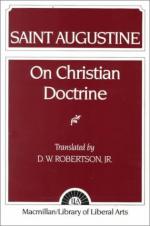
|
| Name: _________________________ | Period: ___________________ |
This test consists of 15 multiple choice questions and 5 short answer questions.
Multiple Choice Questions
1. What setting does Augustine recommend for sound Scriptural learning?
(a) An ecclesiastical structure.
(b) Human communities.
(c) A properly sanctioned site of Scriptural education.
(d) A private audience with a well-trained Priest.
2. In approaching this distinction, what is Augustine's first focus in Book One?
(a) On "special gifts."
(b) On original sin.
(c) On sins of omission.
(d) On things as things.
3. What other subject does Augustine addresses in Book Three and Book Four?
(a) Understanding how to learn from Scripture.
(b) Teaching the doctrines of Scripture.
(c) Understanding how scripture develops community.
(d) Understanding how to convey what one learned from Scripture.
4. What are the two main tools that God uses to teach men what to do, as identified by Augustine?
(a) Scripture and nature.
(b) Wars and rumors of wars.
(c) Priests and Rabbis
(d) Angels and human communities.
5. What does Augustine identify as the relationship between all other things and the object of ultimate worship?
(a) All other things are used as a means to enjoy the Trinity.
(b) Other things are intended to be used as a means of exhibiting Christian love.
(c) Other things are intended to be used as a means of exhibiting Christian love.
(d) All other things can be used for God's purposes through the application of special gifts.
6. How does Augustine use the items of his example to illustrate his distinction?
(a) The meal is enjoyed, but the pot is used.
(b) That critics who do not understand show a lack of interest to discover, but those who believe in special gifts use a false faith to rationalize their lack of interest.
(c) That Lucifer sought to discredit Job's faith, but God realized the depth of Job's convictions.
(d) That Adam made the choice of sin, but Cain responded out of the impulse passed to him from Adam's choice.
7. How does Augustine expect to get the knowledge that he lacks?
(a) He will extensively study in the library at Hippo Regius.
(b) He will collaborate with members of his church community.
(c) He will confer closely with other learned Priests.
(d) God will give him the knowledge that he lacks.
8. What does Augustine claim to be the central law of love and the message of Christianity?
(a) That one thing that is illuminated truth is loving God and then thy neighbor.
(b) That one should love God and love thy neighbor.
(c) That one should find illuminated truth to love God and thy neighbor.
(d) That the one illuminated truth is to love thy neighbor who loves God.
9. How does Augustine characterize the argument that his teaching is not needed because it comes from a human source?
(a) It is being heretical.
(b) It is intolerant.
(c) It is responsible for allowing "babes in the Faith being devoured by the wolves of the world."
(d) It is being logically inconsistent.
10. What does Augustine suggest a conception of Christian love will serve for the student?
(a) It is integral to applying the principles of community.
(b) It is integral to proper Scriptural interpretation.
(c) It will help the student understand God's motivation for interacting with creation.
(d) It will guide the student to become a teacher.
11. What was the third type of criticism that Augustine suggests "On Christian Doctrine" would face?
(a) Criticism from those who claim that Augustine relied too much on training and not enough on divine guidance.
(b) Criticism from those who believe it is not needed.
(c) Criticism that his demands for linguistic studies were too exclusive.
(d) Criticism from those who cannot grasp his teaching.
12. With what prediction does Augustine start "On Christian Doctrine"?
(a) God will assure that the Church will become the primary social force in the world.
(b) Christians will transform society through piety and rhetorical skill.
(c) Christians will gather around a uniform doctrine.
(d) The work will face three kinds of criticism.
13. How are things separated by Augustine?
(a) Categories of things under God's authority and things that are sinful.
(b) Categories of things that are enjoyed and things that are used.
(c) Categories of things that are Biblical and things that are non-Biblical.
(d) Categories of things that are things and things that are signs.
14. According to Augustine, how should a student be affected as he/she becomes proficient in interpreting Scripture?
(a) He/she will help develop a student's teaching skill.
(b) He/she will help to apply the principles of community.
(c) He/she will increase the love that one feels.
(d) He/she will help in developing an understanding of God's motivations.
15. What is the source of teaching Augustine most advocates?
(a) Angels guiding human teachers in spiritual communities.
(b) God directing the student to understand His role in Scripture.
(c) Christ dispensing special gifts without communities.
(d) Human teachers in human communities.
Short Answer Questions
1. What is the problem for the critics that Augustine addresses in the Preface when they choose to teach?
2. According to Augustine, for what reason should one love oneself?
3. In Augustine's example, how can something used also be enjoyed?
4. What should be the nature of the relationship between humans and God according to Augustine?
5. What is Augustine's attitude toward those who have a "special gift" for interpretation from God?
|
This section contains 1,072 words (approx. 4 pages at 300 words per page) |

|




